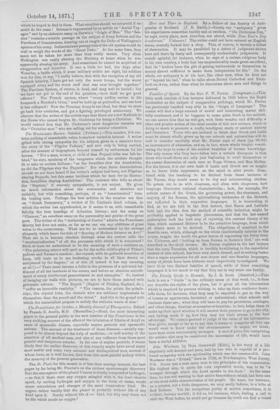Families of Speech. By the Rev. F. W. Farrar. (Longrnans.)—This
little work consists of four lectures delivered iu 1869 before the Royal Institution on the subject of comparative philology, which Mr. Farrar has previously handled very ably in his "Origin of Language." The reader will find a large amount of useful and interesting matter skil- fully condensed, and if ho happens to come quite fresh to the subject, we can assure him that ho will get, with little trouble and difficulty, a clear and precise notion of the chief results of this now science, which is doing so much to promote a really intelligent study of ancient history and literature. Those who are inclined to think that Greek and Latin must be almost wholly given up by our schools and universities will do well to consider carefully what Mr. Farrar says of them (pp. 93-94) as instruments of education, and as, in fact, when wisely taught, consti- tuting the keys to some of the noblest branches of human knowledge. The only reason why they have fallen into a certain disrepute is that those who teach them are only just beginning to avail themselves of the recent discoveries of such men as Bopp, Grimm, and Max Muller. For the future, it is our own fault if Latin and Greek are so taught as to leave little impression on the mind in after years. Com- bined with the teaching to be derived from these lectures of Mr. Farrar, they would cease to be dry and uninteresting studies. He points out to us with clearness, and often with eloquence, how language illustrates national characteristics ; how, for example, the artistic nature of the Greek, the governing power, the sternness, and majesty of the Roman, the spiritualizing tendencies of the Hebrew, are reflected in their respective languages. It is interesting to find, as wo are told in the first lecture, that Bacon and Leibnitz both had the idea that the method of scientific induction might be profitably applied to linguistic phenomena, and that the last-named philosopher took the bold stop of rejecting the current theory of his time, which assumed Hebrew to bo the primitive language, from which all others were to be derived. The obligations of mankind to the Semitic race, which, although on the whole intellectually inferior to the Aryan, taught the world the groat lesson of separating the Deity from the Universe, and "looking up from Nature to Nature's God," are well described in the third lecture. Mr. Farrar explains in his last lecture that the term Turanian, which is terribly bewildering to the superficial student of this subject, has been very much abused, and is nothing better than a vague expression for all non-Aryan and non-Semitic languages, many of ,which have been hitherto most imperfectly investigated. Wo have thus two distinct families of speech, while of those remaining languages it is too much to say that they aro in any sense one family.


































 Previous page
Previous page